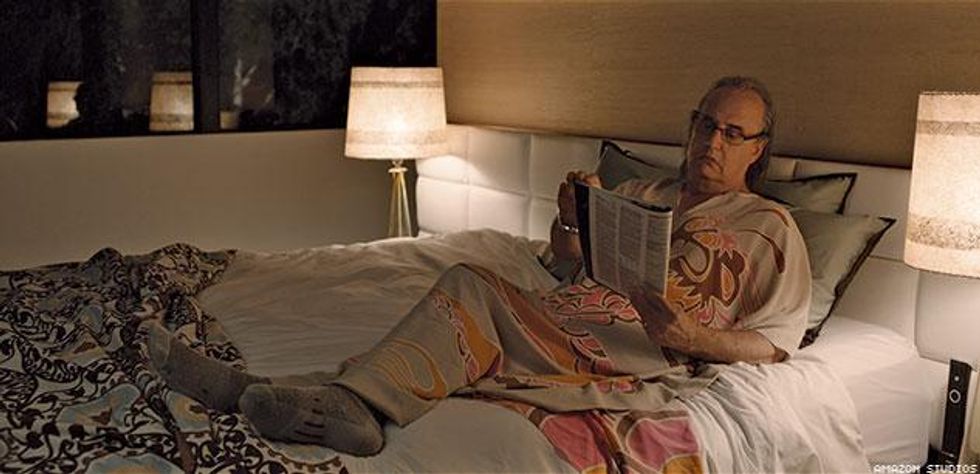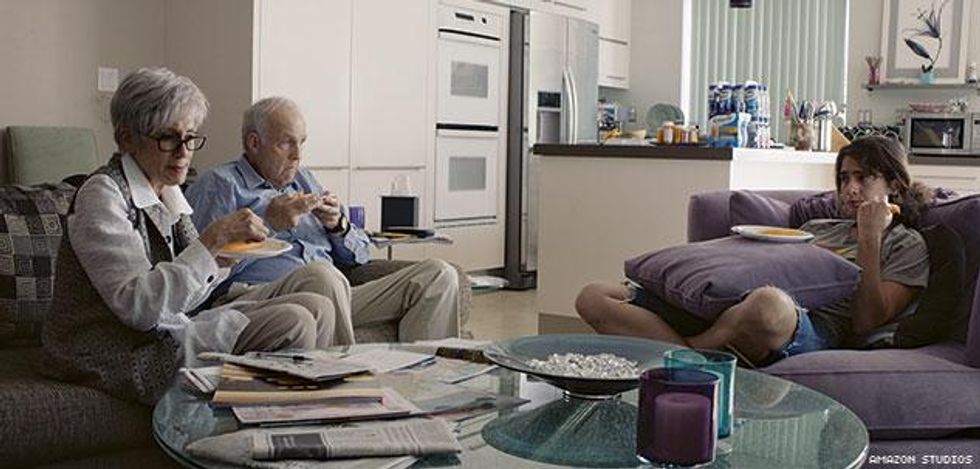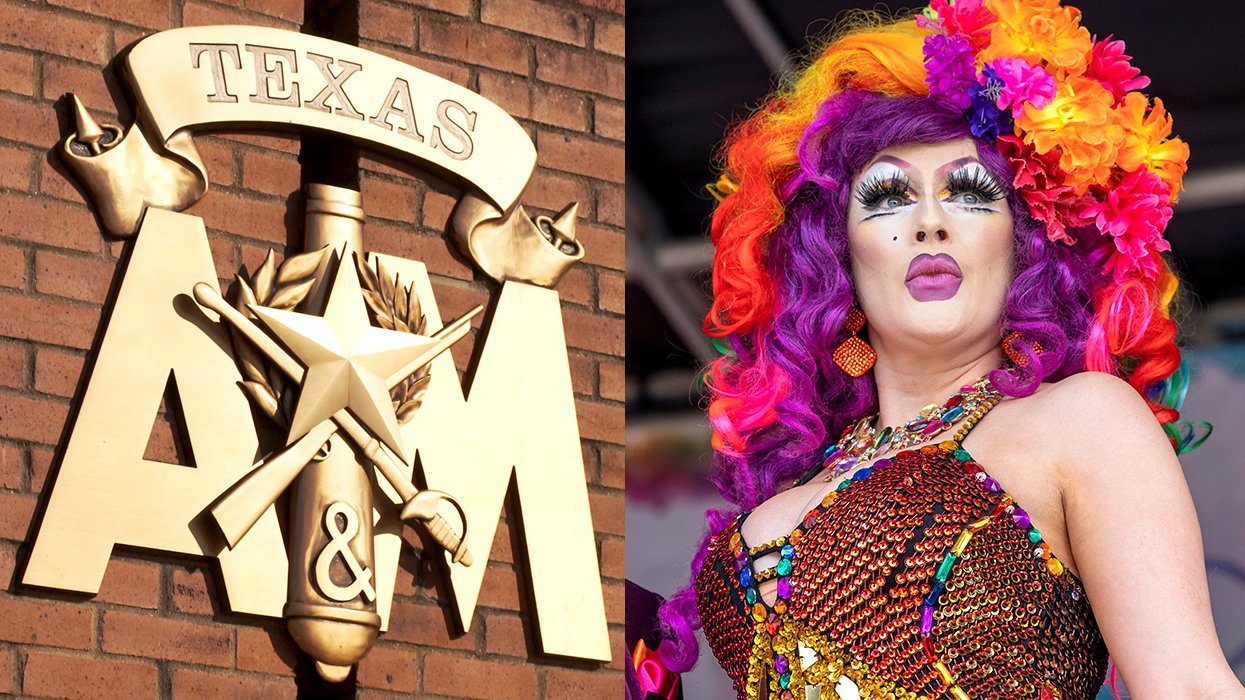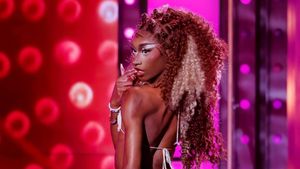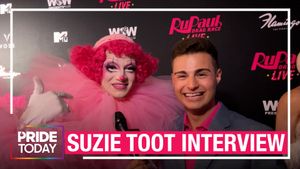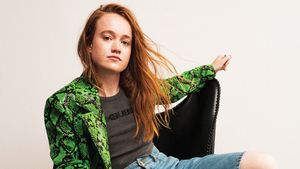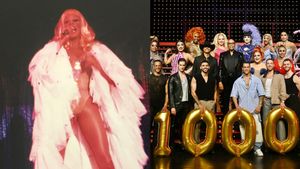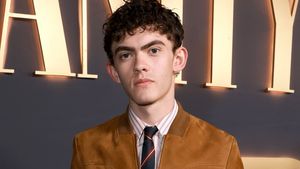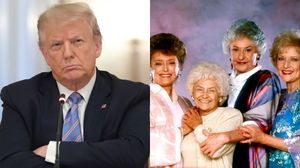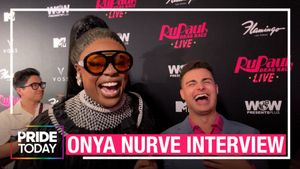Maura is like a lot of Jewish women her age in her affluent West Los Angeles neighborhood of Pacific Palisades. At 70, she's got a creaky knee, impeccably manicured long fingers, an adoring grandchild, and a fascination for the trappings of modern femininity. But Maura has a secret, one betrayed by her receding hairline, one that makes even a trip to Gelson's supermarket a bit stressful. Her family, and much of the world, has no idea she's a woman. They still see her as a man named Mort.
In Transparent, Amazon Originals' highly anticipated new television series, Jeffrey Tambor plays Maura, a transgender woman coming out to the world and her self-absorbed adult children.
The show premieres in late September on Amazon Prime Instant Video -- and all 10 episodes are available to binge watch as of the release date, as with Netflix's Orange Is the New Black. It is the first in a string of original series that Amazon announced earlier this year, selected after several pilots were posted online and fans voted on which should be made into full-fledged series. Transparentwas an instant critical darling, and the fervor with which the public embraced the show still surprises creator Jill Soloway.
"Beyond my wildest dreams," she admits. Soloway -- who has a fan base for her work as co-executive producer of Six Feet Under, showrunner for United States of Tara, and writer-director of the Sundance darling Afternoon Delight -- is speaking with me in the back of Nick and Stef 's, a Los Angeles steak house. Transparent is in production, and the steak house is the set for today's shoot. Soloway is surrounded by extras who strain to hear her talk about the intersections of gender and feminism, why she bought 250 copies of Julia Serano's trans memoir Whipping Girl (they were distributed to cast and crew), and how nervous she was about the pilot's reception.
"I think as artists we always hope that there's going to be that moment where your art hits the public and people go, 'Yay! You're good. We love you.'" But Soloway says she wondered about the show's themes of feminism and queerness, and whether enough people would be interested to support the show. "My expectation was that nothing would happen."
 Showrunner Jill Soloway (top center) and the trans cast and crew that came from her "transfirmative" action program. Top row (from left): Ali Liebegott, Alexandra Billings, Rhys Ernst, Jill Soloway, Ian Harvie, D'lo, Sam Rypinski, Zackary Drucker. Middle row: Lee Faelnar Te, Maya Jafer, Vick Quezada, Leon Mostovoy, Zoe Van Brunt, Jordyn Serwin, Wyatt Gray. Bottom row: Ada Tinnell, Ezrha Jean Black, Van Barnes (Photo by Luke Gilford)
Showrunner Jill Soloway (top center) and the trans cast and crew that came from her "transfirmative" action program. Top row (from left): Ali Liebegott, Alexandra Billings, Rhys Ernst, Jill Soloway, Ian Harvie, D'lo, Sam Rypinski, Zackary Drucker. Middle row: Lee Faelnar Te, Maya Jafer, Vick Quezada, Leon Mostovoy, Zoe Van Brunt, Jordyn Serwin, Wyatt Gray. Bottom row: Ada Tinnell, Ezrha Jean Black, Van Barnes (Photo by Luke Gilford)
Even experienced producers can be dead wrong. Amazon posted the episode on Friday, February 7. "Over the course of that first weekend, it was [huge]," she says. Soloway describes reading reactions that called the pilot "the best thing ever," and "the new House of Cards."
"It was so overwhelming and so exciting," she says. "I didn't get the feeling that it was just gay people, queer people, trans people saying 'Watch this.' It was all kinds of people." She says generations of Jews told her they showed Transparent to their parents, or watched with their kids. "I think our aspirations are really for it to resonate first on that [family] level, and I guess the pilot did."
And the big factor in the positive response is Tambor, an actor beloved by television audiences as George Bluth, Sr., from Arrested Development. In a year when trans actress Laverne Cox is winning accolades for her role as a trans woman in prison on Orange Is the New Black, Tambor -- or really any man -- may seem an unlikely choice to play Maura. Trans advocates have complained. Soloway says she knows how few roles trans actresses get cast in and she's compensated for that elsewhere.
But Tambor is an inspired choice. He's been entering our home via our TV screens for nearly 40 years. After a debut on Kojak, his offbeat, scowling visage has been a regular fixture since he played the snobby, uptight neighbor on The Ropers. But Transparent is new territory, his first trans role -- his first female role as he sees it -- and because the character Maura has not had any medical intervention (no hormones, no surgery) she looks exactly as Tambor would if he were to come out and begin transition today.

He's not a pretty woman, but he is real. And as Soloway says, "America already loves Jeffrey Tambor. To watch him become Mort and then become Maura, it's like, here's somebody you already know and love who is trans."
Tambor is going to make America understand trans women as much as Laverne Cox has; the experience of many trans women who come out later in life is that they do not fit into conventional beauty narratives. Unlike Cox, they are not, without effort, conventionally beautiful.
This is the topic of today's scene. Maura is at lunch with two other trans friends: Shae (Trace Lysette) and Davina (Alexandra Billings). Davina and Maura are talking about Shae, a beautiful young woman who was born petite, transitioned early, and has had cosmetic procedures to look the way she does, which is stunning. Maura, who has had no medical intervention thus far and is contending with decades of testosterone's effects, is melancholy, and envious of Shae's options in the world. There's an unexpected realness to the scene that makes it feel like I'm sitting with some of my middle aged trans friends who came out in midlife and feel the frustrations with a culture that deems them "men in dresses" for not looking the way they're expected to look.
Soloway that's all tied up in transphobia and misogyny, the politics of passing, and the pressure for women to be beautiful, whether they're transgender or cisgender (non-transgender). "In some ways it's just cis privilege," Soloway says, to go without makeup or having one's hair styled and not be "va-va-voom sexy."
"That's something I want to get into as soon as possible -- being a trans woman but saying, you know, 'I'm not going to put on a huge face of makeup and a bunch of hair, and you may not see a beautiful woman when you see me.' In fact, there's a line in this episode where Davina says to Maura, 'There's a big difference between being a woman and being a beautiful woman.' And that's what I think transitioners have to deal with. Sometimes they're not beautiful, and a lot of people think [reactions to them] might be about transphobia, but when you look closer, it's really about transmisogyny because it's about trans women looking the way men want women to look."
The thing is, Jeffrey Tambor says he suddenly feels pretty. His 8-year-old daughter, Evie, came to the set recently and the duo got matching manicures while he explained Maura to her. He snaps his fingers to show how amazingly fast Evie got it. "She just understood that I was playing a character that's more comfortable being a woman," he says, smiling.
Right now he's mostly out of his makeup, but he's still wearing that nail polish, a lovely dark taupe that gives him flair each time he emotes with his hands, which he does often while we talk. Is that Maura, or is that Jeffrey? I wonder frequently.
Tambor says he's suddenly experiencing feelings he's never encountered before. "I'm going to say this -- I mean, it's the truth, but I haven't admitted this to you yet, but being 70 is odd. Looking in the mirror is very, very different, because I go, 'Oh, my dear.' But I love looking in the mirror and looking at Maura." He pauses. "I think she's very, very pretty, and it's been a while since I've looked in the mirror and said, 'Oh, that looks good.' That sounds terribly vain, I don't mean to."
But that doesn't mean he wasn't terrified when he had to disrobe in a scene, a moment he says was very scary. "I was beside myself," he admits, shuddering a bit and pulling his arms around his chest as we talk. "I thought they were going to have to give me a shot. And they just told me that I'm doing a scene next week where I'll have to be under the covers, and I went 'Eeew.' I don't know if I'm just vain or old. That's why Maura is so interesting to me, because she's so pretty and I get another chance to be attractive."
Tambor looks to artist and consultant Rhys Ernst and his partner Zackary Drucker, both of whom are transgender, as the show's official guides to the transgender experience. They became so instrumental to the show that both were named associate producers in August. Ernst has helped Tambor become Maura. With Ernst by his side and dressed in Maura's clothes, Tambor went first to a trans-friendly bar in California's San Fernando Valley, then to a grocery store, then to a valet station. "I remember I was just a nervous wreck, and that was the toughest part of the evening. I'm so glad I did it because I now know what the 'clock' is all about and that whole experience of not fitting in." (The clock, for those who don't know, is when someone recognizes and outs you as a transgender person, rather than just seeing you for the gender you are.)
Tambor is astounded by the affinity he feels for Maura. "I find that there is a gesture that I do, where I go, Oh my God, that's my mother."
People often tell Tambor they assume it's difficult to play a woman, but no, it's not, he says. "That's what's so wonderful about it. She's easily accessible to me. I don't say it's easy to do, but she's just right there. And she's right here," he says, motioning to his heart. "I read all the [trans] books, we did all the meetings, but she's also inside and has been there for a while. I find that in these scenes, I'd think, Oh, that's an aspect of you that you don't even touch. So it's allowing me to touch something that's really meaningful to me. And I love it."
He says that as an artist -- especially someone who has been acting for four decades -- "it is very, very exciting to get up in the morning and go to the set where there's not many footprints before you and everything is new. That's very exciting. I get kind of nervous and jittery anew. I have to throw my technique out the window ... I broke down and I don't know if you saw that in one of the scenes when I can't stop crying. It's very satisfying, very -- and then Jill I trust with my life."
Soloway, who came to fame working on Six Feet Under, wanted to do "a show that was about a family where the sex and love were more on the surface." Rather than a parent dying in the first few minutes, Transparent would feature a parent being born. It would ask what it feels like to have a family member that the family never knew was there all along.
When Soloway talks about the transgender moment we're seeing in popular culture or extolling the virtues of Tambor in the role, she talks like a queer person herself. "Queer" and "trans" are words she uses frequently to describe "us," and when I mention what TERF (trans-exclusionary radical feminism) stands for and how great it is to meet a self-described radical feminist who is openly trans-inclusive, she creates a new moniker for herself -- and by extension others like her: "I should be a TARF, a trans-allied radical feminist."
Her sister, lesbian musician and screenwriter Faith Soloway, left Hollywood years ago but she returned this year to help Jill with crafting Transparent. Besides Faith, Soloway has "so many friends who are queer and so many friends who are trans that it just always seemed obvious to me what an incredible metaphor being trans is... for all kinds of transformation, all kinds of transcendence, all kinds of change. And the big question, I think, that we're asking with this show is, Will you still love me if? Will you still be there if? It just feels like sort of the right question for a family drama and the right time for it."
In addition to bringing on board her sister and a number of high profile queer and trans artists (including filmmaker Andrea Sperling, author Ali Liebegott, actress Alexandra Billings, comedian Ian Harvie, and musician D'lo), Soloway recognized a kindered spirit in Ernst. The two met at Sundance years ago; he had a film playing the same year. They kept in touch and later Soloway asked he and Drucker to collaborate on the show.
"Jill kind of opened the door and led the way. She's completely dedicated to getting this right," Ernst says. "Zackary and I have connected a lot of people from the community to the show. There are about 12 speaking roles that are played by trans actors. We have a 'transfirmative' action initiative that we created, so we've been getting trans people hired in as many departments as possible. We have [LGBT] people behind the camera. We have gender-neutral bathrooms at our offices at Paramount."
Soloway butts in, with a smile: "That's causing all kinds of trouble. It's really interesting to see what happens when we try to subvert the order."
"We're bucking the system," Ernst says, "but it's becoming a teachable moment. I think it's a really important top-down, comprehensive approach to how to get trans and queer topics right in a big operation like this, which is not just answering one question of casting. [This show's] setting a precedent by hiring queer and trans people all the way through the production, doing info sessions consistently throughout, from the beginning to the end, and educating all the different kinds of people on the production."
Right now at least 20 percent of the crew is LGBT (perhaps more), and informational sessions are conducted during production. Ernst says their info sessions are like a Trans 101 course. The day before I visited the set, they spoke to the cast about trans history and current trans political issues, "giving them the whole backdrop so the have this whole kind of world they can hold on. It's not just a one liner or something like that."
"Rhys and Zachary also talked to the crew leading up to the production meeting," Soloway brags. "They'll sometimes start it off with, 'Go ahead. Let's ask all the stupid questions. Let's get them out.' Just trying to make sure that there is as little otherizing as possible."
It's a rare TV series where the showrunner and her advisors talk about dismantling the system and creating what Ernst calls "gender freedom for everybody," but these two do.
"I think it is bringing up all this questions for people, he says. "It's kind of profound. I get a lot of follow-up questions from people in the crew who are like, 'I've been telling my friends and community about this and they're just so fascinated. Can I take some of the literature and show my friends and family?' It's having this incredible ripple effect."

Transparent's appeal has a lot to do with the show's family dimension. Maura's ex-wife is played by Judith Light (above left), an accomplished actress and longtime LGBT activist, and her youngest daughter is played by the outstanding Gaby Hoffmann (above right).
Indeed, I expect the TV show itself will have a ripple effect, in part because while it's Maura's journey, she's not the only likeable character. Each of her kids present you with multiple layers, different personalities, and nuanced emotions to where you may identify with one or all of them at any given time. In that way, it's like the 1970s series Family (which coincidentally featured two not-yet-out lesbian actresses, Kristy McNichol and Meredith Baxter).
"What was very interesting to me was, I don't know a family that can't relate to this in terms of one person in the family goes through a change and everybody else has to change around that," Tambor says. "That to me is very powerful, very modern, and very, very beautiful."
Tambor was particularly excited about the show's family appeal: "There's a scene in the pilot that I always hearken to for inspiration, where we're all sitting around the table and everybody has their own agony of what they can't quite express." In it, Maura stumblingly tries, but fails, to come out to her children, but while she's attempting, they assume their father is trying to reveal a cancer diagnosis. Maura defaults reluctantly to the closet, and instead announces she's selling the family home.
Soloway says her aspirations are for Transparent to resonate first as a family series, and indeed there are nods to some of the classics, but with more Jewish characters -- and some of those characters feel a bit like the Soloway sisters themselves.
"What it feels like when you watch it is sort of a family show like Thirtysomething or even, dare we all say it, All in the Family or The Cosby Show," Soloway says. "I think both Faith and I can be found in all three kids regardless of their gender," Soloway says of her sister Faith Soloway, an out folksinger and comedian, who returned to Hollywood to collaborate with Jill on Transparent as a writer. "We really want to experiment with what it means to have an emotional, social, and potentially spiritual legacy with gender queerness in your family. What would happen if we got to watch these three kids wrestle with the question of their own gender identity?"
The actors and Soloway have been quick to say this show could not have been made with a traditional network. Hoffmann told reporters at the show's Television Critics Associa- tion panel in July that the idea that the actors are making a sacrifice of a kind to work for Amazon is dead wrong: "This is a privilege, working with Joe and Amazon," she said, referring to Joe Lewis, Amazon Studios' head of original programming. "They are our allies and supporters and cheerleaders. They're letting this show be what we want it to be and need it to be."
It's clear that Soloway, Tambor, Ernst and Drucker, and the whole cast and crew aren't settling for anything less than revolution with this show. Plenty of people on the set are hoping for a miracle in Transparent, and maybe after this year -- the significant buzz over the pilot, the Time magazine "tipping point" cover with Laverne Cox, the huge embrace of transgender kids on YouTube -- perhaps they'll have it. There's something almost magical on the set, a sense of camaraderie and change, like a 1970s women's music festival where the lesbian folk musicians think they can change the world with their songs.
"My hope is that the show is going to be so emotionally, spiritually, sexually revolutionary that you won't just watch it once," Soloway says, chuckling after saying "revolutionary" for perhaps the 15th time in under two hours. "I want people to be laughing, I want them to be crying, and I want them to be turned on. I want them to have all three of those happening simultaneously. Maybe the show can do something that hasn't been done before."
Call me crazy, but I honestly think it can. I left the set feeling sad, hopeful, and yes, a little aroused -- by Soloway's sexual revolution talk, by Maura's feminine grace, by the queer energy of the set -- and I can kind of hear Joan Baez and a round of "Kumbaya" ringing in my ears.
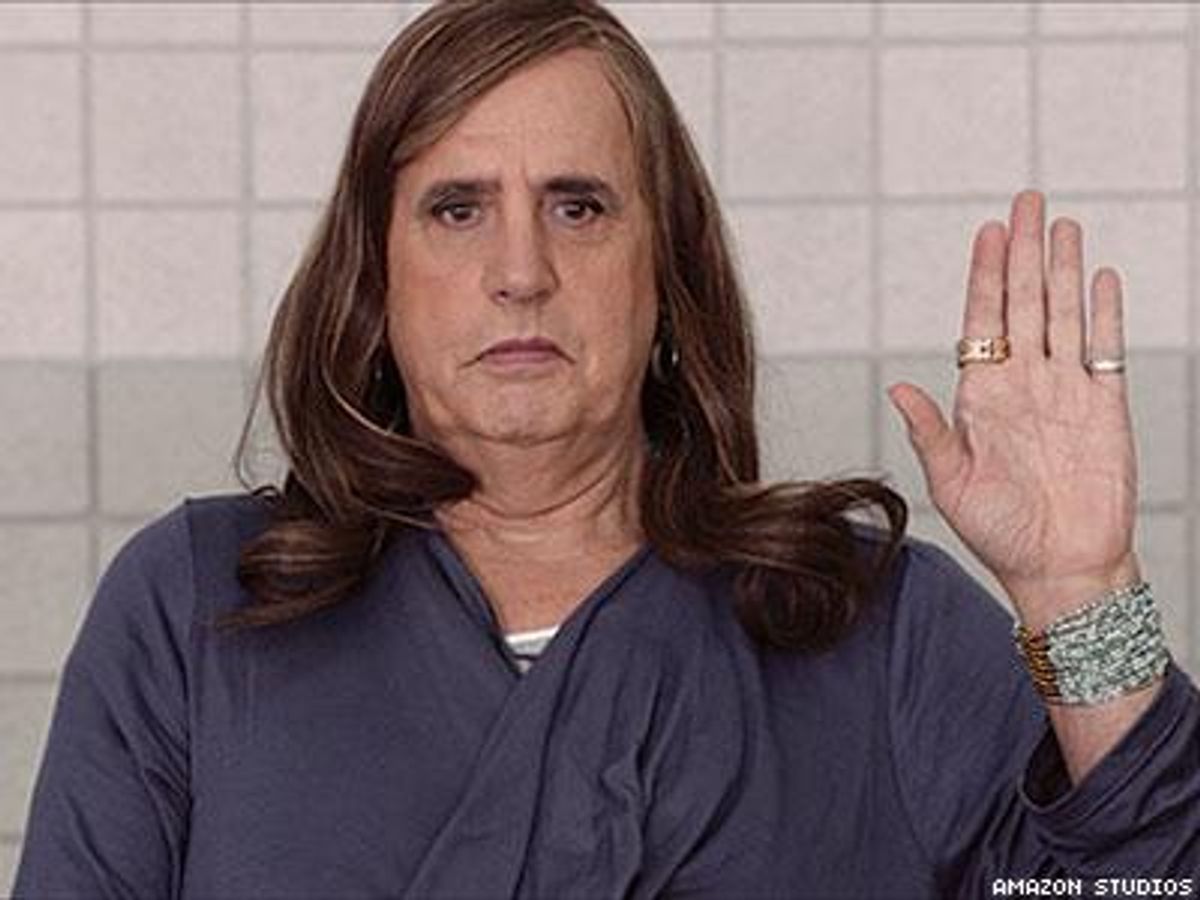

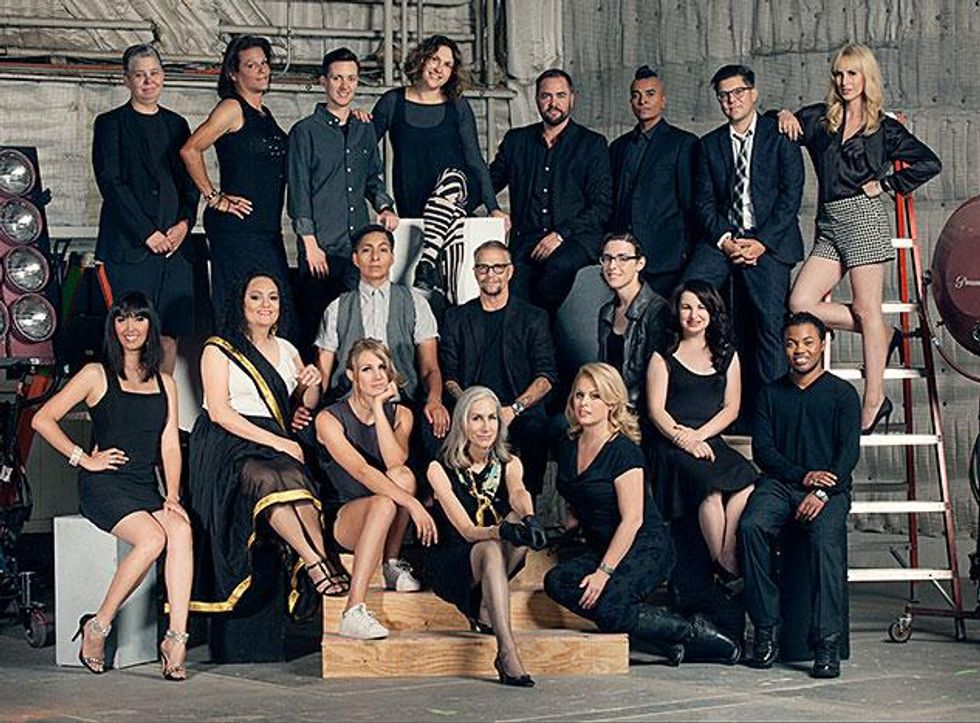 Showrunner Jill Soloway (top center) and the trans cast and crew that came from her "transfirmative" action program. Top row (from left): Ali Liebegott, Alexandra Billings, Rhys Ernst, Jill Soloway, Ian Harvie, D'lo, Sam Rypinski, Zackary Drucker. Middle row: Lee Faelnar Te, Maya Jafer, Vick Quezada, Leon Mostovoy, Zoe Van Brunt, Jordyn Serwin, Wyatt Gray. Bottom row: Ada Tinnell, Ezrha Jean Black, Van Barnes (Photo by Luke Gilford)
Showrunner Jill Soloway (top center) and the trans cast and crew that came from her "transfirmative" action program. Top row (from left): Ali Liebegott, Alexandra Billings, Rhys Ernst, Jill Soloway, Ian Harvie, D'lo, Sam Rypinski, Zackary Drucker. Middle row: Lee Faelnar Te, Maya Jafer, Vick Quezada, Leon Mostovoy, Zoe Van Brunt, Jordyn Serwin, Wyatt Gray. Bottom row: Ada Tinnell, Ezrha Jean Black, Van Barnes (Photo by Luke Gilford)